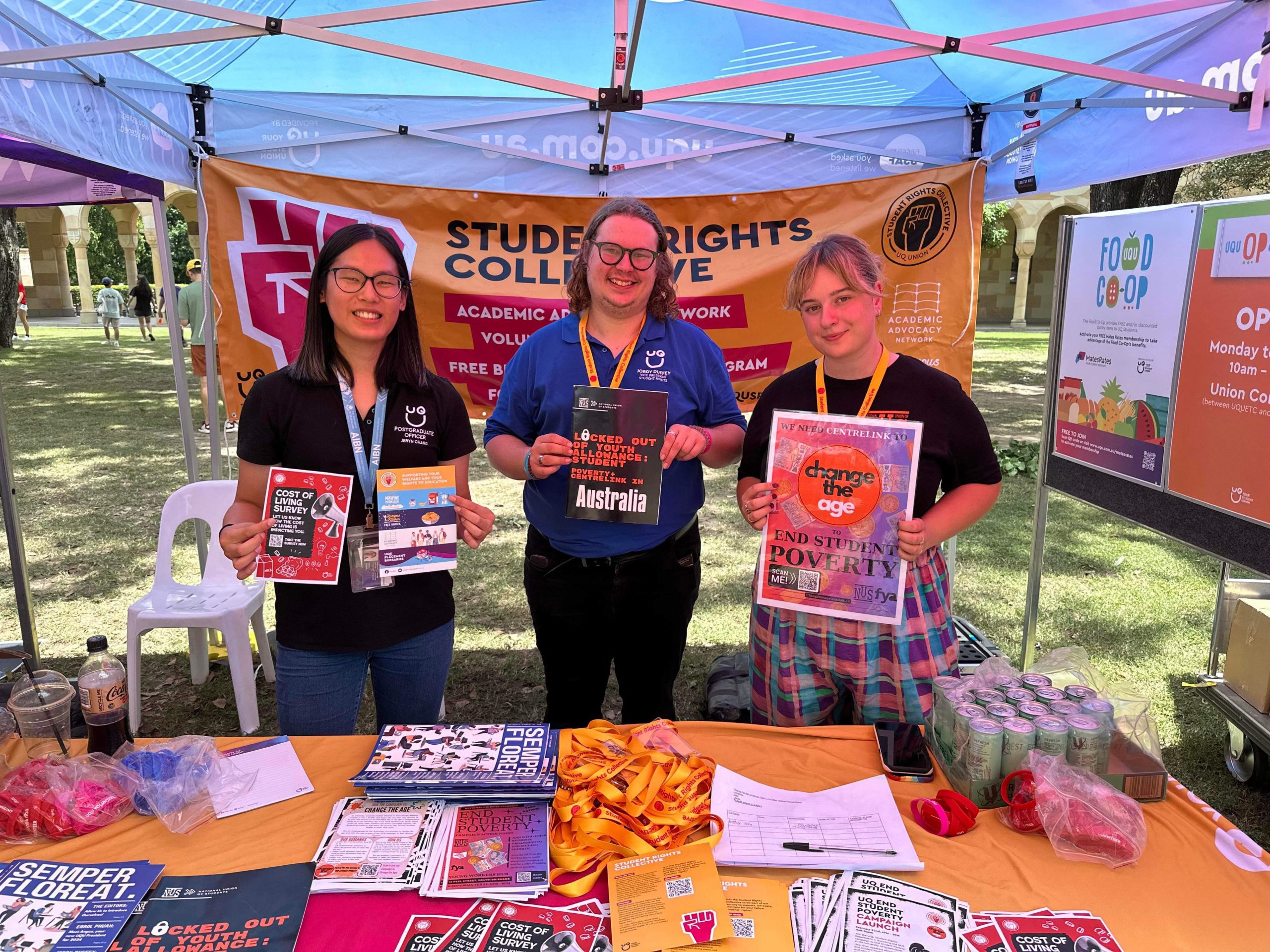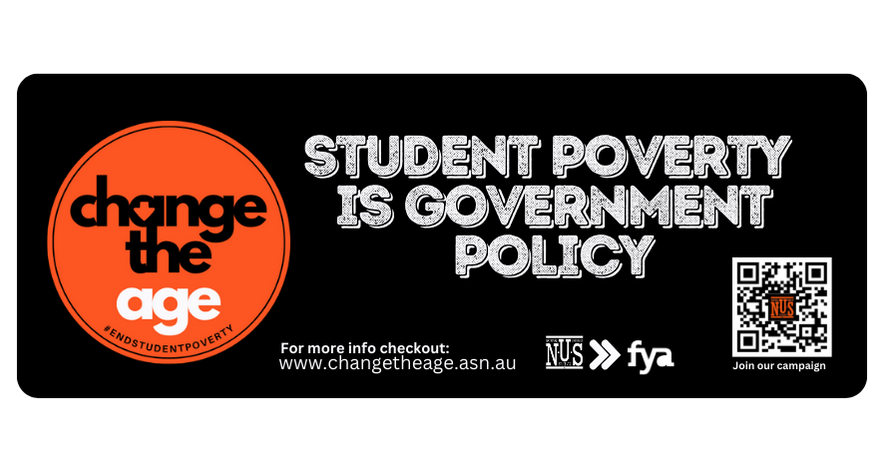
To attend university, study and attend classes or to miss a class and that time you wanted to study to work a shift to earn some extra income to afford the incoming week’s rent or bill you need to pay – that is the reoccurring question that many students are now asking themselves because of the cost-of-living crisis.
Whilst we are faced with this dilemma and want to ensure that we are applying ourselves to our university studies – the unfortunate reality for many university students is that we cannot simply afford to commit to dedicating the required time to study (10 hours per 2-unit course) that is expected of us.
Many students continue to experience financial stress towards being able to afford their living expenses or put food on the table and, in doing so, are going part-time to ensure that they can financially support themselves whilst being able to study to alleviate this stress. Not every student can afford to study part-time either, with international students being required to study full-time and being limited to working 48 hours a fortnight as part of their visa requirements.
Further to this, those who are research students continue to face financial barriers and stress with the cost-of-living crisis where realistically they are expected to work full time whilst being paid below minimum wage stipends and postgraduate students more broadly are denied access to government support payments depending on what they are studying because it not recognised as an approved course of study for these payments.
So, whilst the cost of living and housing crises continue to be issues that we experience, what is being done to address the overarching issue of student poverty and ensure that the well-being and welfare of university students are a priority? The short answer is currently nothing but band-aid solutions.
Further to this, those who are research students continue to face financial barriers and stress with the cost-of-living crisis where realistically they are expected to work full time whilst being paid below minimum wage stipends and postgraduate students more broadly are denied access to government support payments depending on what they are studying because it not recognised as an approved course of study for these payments.
Over the last year, the Albanese federal government has introduced policies to address the overwhelming cost of living crisis. These have included changing the stage 3 tax cuts, a package introduced by the Morrison Government in 2019 that will provide some tax relief to those on low and middle incomes.
Further to this, the budget delivered in 2023 by the Albanese Government provided a $40 per fortnight increase for Youth Allowance, Austudy, ABSTUDY, Disability Support Pension and Jobseeker payments; this is a $2.85 a day increase and was considered by the government as a boost in support to those most in need. These measures, whilst intending to offer some relief towards the cost of living, are not enough to address the overwhelming issues students continue to experience in terms of cost of living and student poverty and continue to neglect the needs of students.
For instance, in 2022, the National Union of Students (NUS) and the Foundation for Young Australians (FYA) released a report called ‘Locked out of Youth Allowance: Student Poverty and Centrelink in Australia’; this report highlighted many of the ongoing issues students experience in terms of the lack of accessibility towards Centrelink and the financial support available for them whilst they are studying. The report highlighted that the majority of students aged 18-21 (over 450,000 students) are excluded from accessing Youth Allowance payments due to the Age of Independence being 22 and that young people who are aged 18-21 who can access this payment are well and truly paid below the poverty line. Because of the lack of access to support payments like Youth Allowance and its being below the poverty line has negatively impacted students’ own financial well-being, mental health, and their ability towards their education. These are just some of the issues many students are experiencing whilst facing student poverty, and they cannot continue to be ignored.
With the current state of the welfare system in Australia, which operates towards supporting students, I’m not afraid to say that the system is broken. It is a system that continues to neglect to address and support the welfare and wellbeing of students, where studying is becoming less of an option for many people. Many people are contemplating whether it is worth attending university given how expensive it has become and the ongoing cost of living crisis. The Australian Council of Social Services (ACOSS) and the University of New South Wales (UNSW), in their ‘Poverty in Australia 2023: Who is Affected’ report, revealed that 419,000 young people are living in poverty, and this is to the fact that many young people face relatively high rates of unemployment and under-employment (inadequately paid hours) and many are out of the labour force while studying fulltime. These statistics alone should be alarming and highlight why ending student poverty must be a priority and addressed this year.
The federal and state governments need to do more to ensure that students are provided with the support they need to study and contribute towards their university studies. In the last few years – cost of living relief has been the topic of discussion for governments and what they are doing to address this issue, but this year, with the federal budget being delivered in May – cost of living will most definitely be the hot topic and a focus.
With this being the case, the federal government must address student poverty to address the overwhelming cost of living issue. We cannot afford band-aid solutions that only provide small relief. The measurements that the federal government should be doing to address these issues include changing the age of independence for Centrelink from 22 to 18 and raising the rate of all income support payments above the poverty line and to a liveable income; abolishing unpaid placements; increasing the HDR stipend to a liveable wage and one that is not below the poverty line and ensure that all income support payments are accessible to all students especially postgraduate students and those studying part-time; increasing the working hour limit for international students and ensure that there is affordable and safe housing for all students to access. These are only a number of solutions that can hopefully address the ongoing issue of student poverty.
In the lead-up to the federal budget being delivered in May, the UQ Union Student Rights Collective is involved with the NUS campaign to end student poverty. We will launch the campaign on the St Lucia campus on February 22nd at 6 pm in the Holt Room. If you are frustrated with how inaccessible Centrelink and income support payments are and the lack of support that is available to support students financially and their welfare and wellbeing whilst studying believe that more needs to be done to address the issue of student poverty.
We encourage everyone to come along and join us and hear more about how you can be more involved with the campaign to end student poverty.
We need to let the government know that students demand change and that no student should have to live in poverty while studying!

Views: 304
